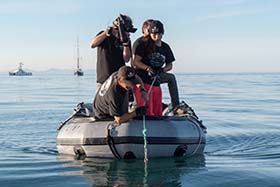Making the Difference for the Vaquita
Published by Sea Shepherd Conservation Society
Making the Difference for the Vaquita
By Captain Oona Layolle
 Crew remove an illegal totoaba long line from the vaquita refuge. Photo: Carolina A CastroAfter the highly anticipated arrival of the Farley Mowat to the Sea of Cortez, we have concentrated on testing different techniques to find illegal fishing gear hidden undersea. The gear is placed to catch the endangered Totoaba, and those same nets also are trapping and killing the Vaquita Marina, the most endangered porpoise in the world.
Crew remove an illegal totoaba long line from the vaquita refuge. Photo: Carolina A CastroAfter the highly anticipated arrival of the Farley Mowat to the Sea of Cortez, we have concentrated on testing different techniques to find illegal fishing gear hidden undersea. The gear is placed to catch the endangered Totoaba, and those same nets also are trapping and killing the Vaquita Marina, the most endangered porpoise in the world.
Finding those nets has not been an easy task.
First, the weather hasn’t helped. The winter storms forced us to shelter for two weeks while we waited out the high winds and huge swell – hoping that at least the bad weather would keep the poachers from fishing. Unfortunately, the nets are always there,left under the sea, and set to kill. We also learned that some poachers went out, undeterred by the worsening weather conditions. Since we’ve arrived, we have heard about eleven illegal fishermen that have died from trying to fish during the storms. It is shocking to see how far the hunger for money can drive this awful illegal act.
This past week the campaign strategy has been adjusted, and the right tools to find the nets are working perfectly. This is thanks to the hard work of the volunteers aboard the M/V Farley Mowat and the R/V Martin Sheen. We are now finding an average of one illegal fishing gear per day, which we retrieve them from the sea and give to the navy. The Martin Sheen and the Wolf (the Farley Mowat’s tender) are dragging the net retrieval hooks in search patterns to find nets day and night. Meawhile the Farley assures their safety at night, chasing illegal boats and retrieving the nets from the sea once found by the search teams. We then notify the navy that comes to help retrieve the nets and they come to pick up the seized illegal fishing gear.
Over the past three days we have finally gotten some good weather, and with it great success. With our latest campaign strategies and techniques, we’ve managed to find two Totoaba nets. One of those nets was the largest size used in the Sea of Cortez, at a length of 500 meters, which had unfortunately already claimed the life of one Totoaba. Additionally, a fishing camp was discovered, where we found and seized a hidden Totoaba net and an illegal long line, which is also used to catch Totoabas. Next, we discovered a submerged long line in the refuge, where we were able to free three Totoaba, which had been ensnared by the brutal device. All the fishing gear and the killed endangered animals were given to the Mexican Navy.
It is a relief for the entire Milagro team to be able to find and retrieve those killing tools, and to help save the wildlife that was able to survive until our arrival. We are restless and passionate by our work. The crew is very proud of getting all the killing tools out of harm for the vaquita and the totoaba.
 Katja Whalter holds up an illegal totoaba net the she and the crew retrieve in the vaquita habitat. Photo: Carolina A Castro
Katja Whalter holds up an illegal totoaba net the she and the crew retrieve in the vaquita habitat. Photo: Carolina A Castro
 Captain Oona greets the Navy captain who helps SSCS retrieve illegal net. Photo: Carolina A Castro
Captain Oona greets the Navy captain who helps SSCS retrieve illegal net. Photo: Carolina A Castro
 Farley Mowat’s bosun Adam Conniss removing a dead totoaba bass from an illegal totoaba net in the vaquita habitat. Photo: Carolina A Castro
Farley Mowat’s bosun Adam Conniss removing a dead totoaba bass from an illegal totoaba net in the vaquita habitat. Photo: Carolina A Castro
 Crew delivers the illegal long line and hooks to the navy for destruction of poaching material. Photo: Carolina A Castro
Crew delivers the illegal long line and hooks to the navy for destruction of poaching material. Photo: Carolina A Castro
 The SS crew finds and saves a totoaba from an illegal long line. Photo: Roy Sasano
The SS crew finds and saves a totoaba from an illegal long line. Photo: Roy Sasano
 Dead totoaba bass recovered by the SSCS crew and handed to the Mexican Authorities. Photo: Carolina A Castro
Dead totoaba bass recovered by the SSCS crew and handed to the Mexican Authorities. Photo: Carolina A Castro
Read the full article at: http://www.seashepherd.org/commentary-and-editorials/2016/02/15/making-the-difference-for-the-vaquita-753



